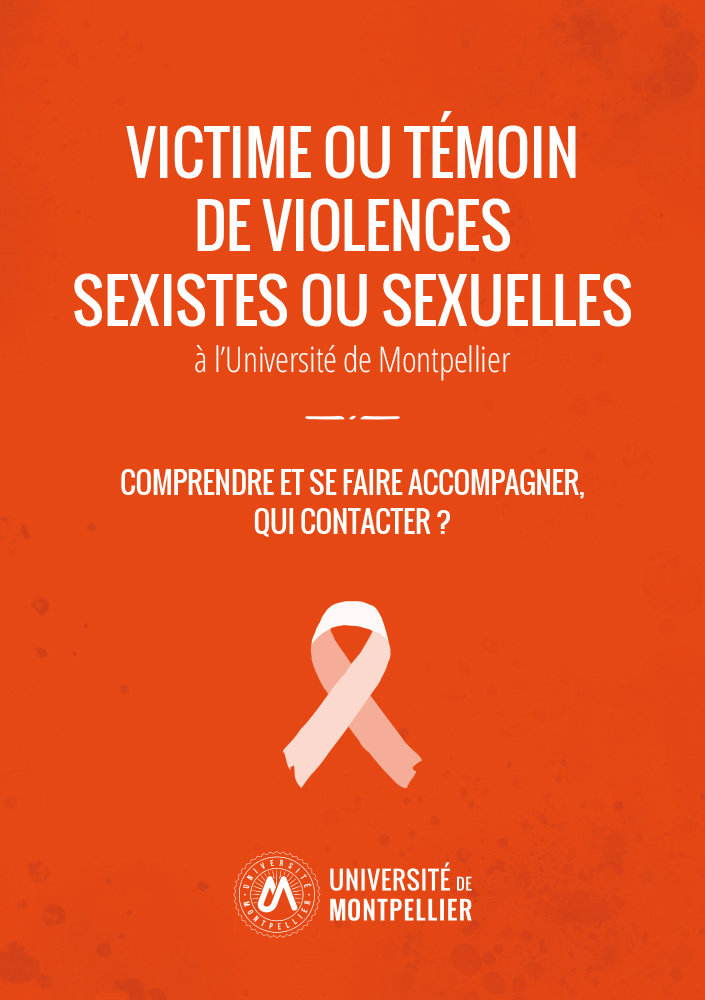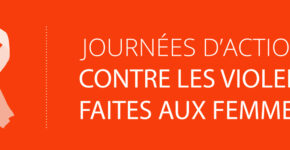Report acts of violence, discrimination, harassment, and sexist behavior
As part of its gender equality plan, and to combat all forms of discrimination and violence, UM has set up an internal system based on designated contacts and a support unit made up of a network of support workers. This system is available to the entire university community, whether they are victims or witnesses of acts of violence, discrimination, moral or sexual harassment, or sexist behavior.
To support you: the advisors and members of the listening team
Whether you are a student or staff member at UM, the UM support unit is there to help you, to listen to your concerns and provide confidential support. The listening unit is made up of the gender equality officer, the vice president in charge of social responsibility, the head of the quality of life at work department, a representative from the preventive medicine department, the student life department (for students), the human resources department, and UM social service assistants (for staff).
These individuals can welcome you, advise you, inform you, and guide you, without judgment and in complete confidentiality.
Contact details for the helpline's point persons
Preferred contacts whether you are a student or staff member at UM.
To report gender-based or sexual violence:
To report all other acts of violence, discrimination, or bullying:
Main contacts for other members of the listening unit
For students:
- The Joint Preventive Medicine and Health Promotion Service
Tel.: 04 34 43 30 87
Email - Student Services
Email
For staff:
Other contacts to assist you
For students:
- The director of your department (faculty, school, or institute)
- Your student representatives in governing bodies (Board of Directors, CFVU, departmental councils, etc.).
For staff:
- Trade unions
- The F3SCT
- Your line manager
What is a report card for?
Whether you are a victim or a witness, an internal UM reporting form is available below and on the intranet (for staff).
This form allows you to describe what you have been a victim of or witnessed. It is useful for establishing the facts accurately, and also allows you to keep a record if you need time to think before taking action.
To complete the form, you can seek assistance from the support unit advisors, any UM support professional, or any trusted individual.
You can attach any evidence you deem useful (testimonials, recordings, photos, text messages, emails, etc.).
Download the report form:
The main stages of the system implemented at UM
- Report to the designated representatives or other members of the listening unit, preferably by sending the report form. In the event of exceptionally serious incidents (e.g., physical violence), the President and the Director General of Services must be notified directly by any person without delay.
- The victim is offered a meeting with the representatives or other members of the support team.
- An interview is offered to the person or persons who are the subject of the report with the representatives or other members of the listening unit.
- Subsequently, feedback is provided to the victim. In certain less serious cases (such as isolated instances of sexist remarks), and with the victim's consent, the designated persons may seek a simple resolution to the conflict.
- If a simple resolution cannot be envisaged, the procedure is continued with the victim's consent. The file is then anonymized (report form + evidence). Depending on the situation, the file is either sent directly to the Directorate of General and Institutional Affairs (DAGI) – Support Office – Disciplinary Sections, or it is first analyzed by the listening unit before being sent to the DAGI (a report of this meeting is then drawn up). The victim is informed of the follow-up to the case by the persons in charge.
- If the case is deemed unfounded by the DAGI, the appeal procedures are specified by this department and the victim is informed accordingly.
- If the case has sufficient grounds, it is referred to the President. The victim is informed of this referral.
- The President decides on the action to be taken in response to the report (request for additional information and/or notification of the prosecutor and/or initiation of disciplinary proceedings, etc.).
- If disciplinary proceedings are initiated, the victim's anonymity is lifted with regard to the members of the disciplinary section.
Victim or witness of gender-based or sexual violence? Understanding and getting support, who to contact?
Because the higher education sector is unfortunately not immune to sexist behavior, UM has developed a specific guide to provide the best possible support to victims of sexist and sexual violence.
This guide is primarily intended for them, so that they feel listened to, respected, and guided. It is also intended for colleagues, friends, and witnesses, who may also seek information to better understand and support victims. Finally, this guide is intended for the entire university community so that everyone is aware that the University is a place where equality is an inalienable principle and that it will not tolerate such behavior.
In this guide, you will find information on:
- what the law says
- the consequences for the victims
- the UM listening unit
- the procedures implemented at UM and outside UM
- penalties
Useful contacts outside the University of Montpellier
- Violence against women helpline: 39 19 (free and anonymous call). 24 hours a day, 7 days a week.
- Let's stop violence: here.
- Portal for reporting gender-based and sexual violence: here.
- Police alert by text message: 114.
- National toll-free number for people who are deaf, hard of hearing, aphasic, or dysphasic. Available 24 hours a day, 7 days a week.
- Pharmacies: victims of violence can raise the alarm there.
- Women's and Family Rights Information Center (CIDFF):
- Consultation hours with a psychologist and lawyer. Contact the CIDFF in your department.
- Social worker at Montpellier Police Headquarters:
Ms. Fatiha Bounoua, +33 (0)6 74 94 49 73.
Support for victims and liaison between police and medical services.




